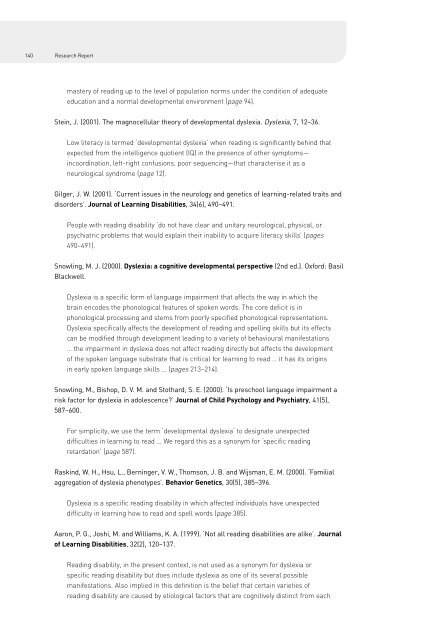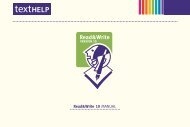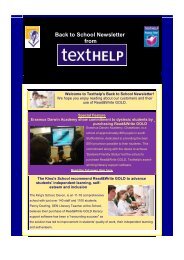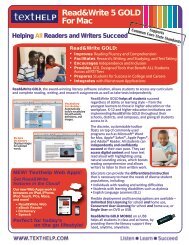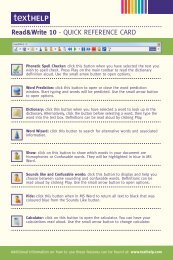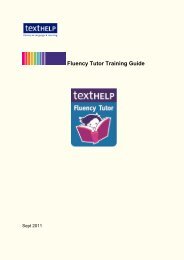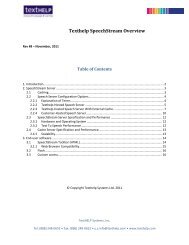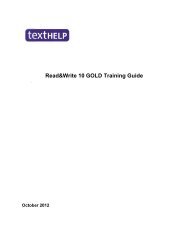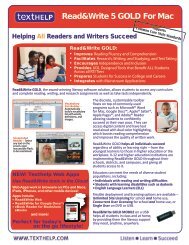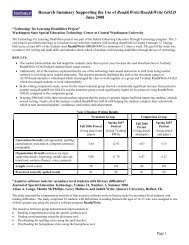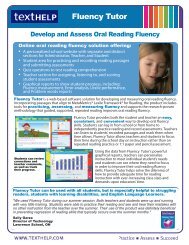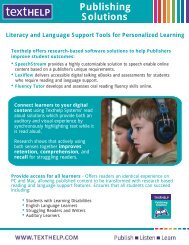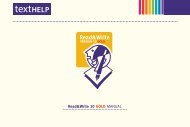01 NRDC Dyslexia 1-88 update - Texthelp
01 NRDC Dyslexia 1-88 update - Texthelp
01 NRDC Dyslexia 1-88 update - Texthelp
Create successful ePaper yourself
Turn your PDF publications into a flip-book with our unique Google optimized e-Paper software.
140<br />
Research Report<br />
mastery of reading up to the level of population norms under the condition of adequate<br />
education and a normal developmental environment (page 94).<br />
Stein, J. (20<strong>01</strong>). The magnocellular theory of developmental dyslexia. <strong>Dyslexia</strong>, 7, 12–36.<br />
Low literacy is termed ‘developmental dyslexia’ when reading is significantly behind that<br />
expected from the intelligence quotient (IQ) in the presence of other symptoms—<br />
incoordination, left-right confusions, poor sequencing—that characterise it as a<br />
neurological syndrome (page 12).<br />
Gilger, J. W. (20<strong>01</strong>). ‘Current issues in the neurology and genetics of learning-related traits and<br />
disorders’. Journal of Learning Disabilities, 34(6), 490–491.<br />
People with reading disability ‘do not have clear and unitary neurological, physical, or<br />
psychiatric problems that would explain their inability to acquire literacy skills’ (pages<br />
490–491).<br />
Snowling, M. J. (2000). <strong>Dyslexia</strong>: a cognitive developmental perspective (2nd ed.). Oxford: Basil<br />
Blackwell.<br />
<strong>Dyslexia</strong> is a specific form of language impairment that affects the way in which the<br />
brain encodes the phonological features of spoken words. The core deficit is in<br />
phonological processing and stems from poorly specified phonological representations.<br />
<strong>Dyslexia</strong> specifically affects the development of reading and spelling skills but its effects<br />
can be modified through development leading to a variety of behavioural manifestations<br />
… the impairment in dyslexia does not affect reading directly but affects the development<br />
of the spoken language substrate that is critical for learning to read … it has its origins<br />
in early spoken language skills … (pages 213–214).<br />
Snowling, M., Bishop, D. V. M. and Stothard, S. E. (2000). ‘Is preschool language impairment a<br />
risk factor for dyslexia in adolescence?’ Journal of Child Psychology and Psychiatry, 41(5),<br />
587–600.<br />
For simplicity, we use the term ‘developmental dyslexia’ to designate unexpected<br />
difficulties in learning to read … We regard this as a synonym for ‘specific reading<br />
retardation’ (page 587).<br />
Raskind, W. H., Hsu, L., Berninger, V. W., Thomson, J. B. and Wijsman, E. M. (2000). ‘Familial<br />
aggregation of dyslexia phenotypes’. Behavior Genetics, 30(5), 385–396.<br />
<strong>Dyslexia</strong> is a specific reading disability in which affected individuals have unexpected<br />
difficulty in learning how to read and spell words (page 385).<br />
Aaron, P. G., Joshi, M. and Williams, K. A. (1999). ‘Not all reading disabilities are alike’. Journal<br />
of Learning Disabilities, 32(2), 120–137.<br />
Reading disability, in the present context, is not used as a synonym for dyslexia or<br />
specific reading disability but does include dyslexia as one of its several possible<br />
manifestations. Also implied in this definition is the belief that certain varieties of<br />
reading disability are caused by etiological factors that are cognitively distinct from each


